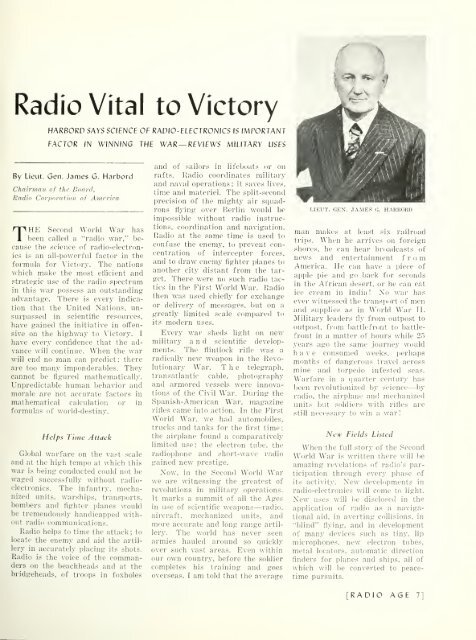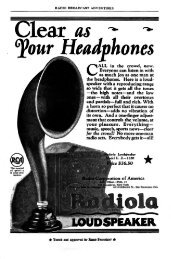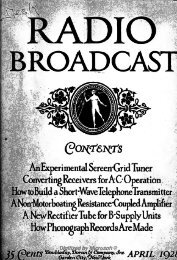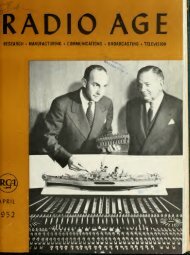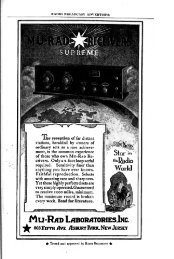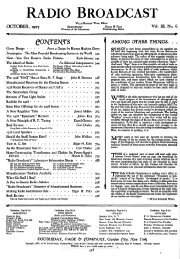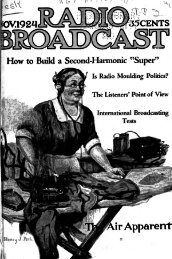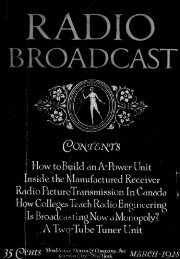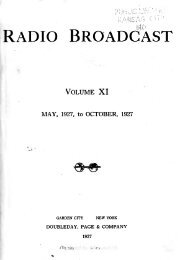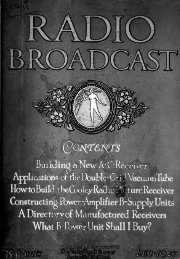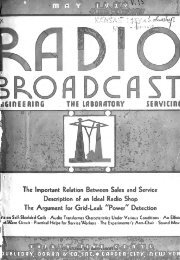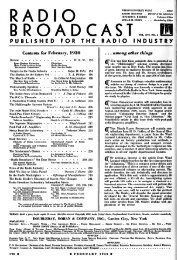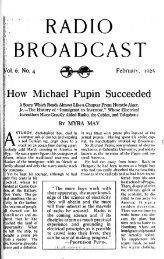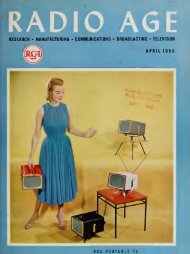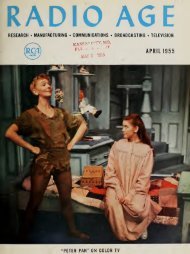Radio Age - 1944, January - 36 Pages, 3.3 MB ... - VacuumTubeEra
Radio Age - 1944, January - 36 Pages, 3.3 MB ... - VacuumTubeEra
Radio Age - 1944, January - 36 Pages, 3.3 MB ... - VacuumTubeEra
Create successful ePaper yourself
Turn your PDF publications into a flip-book with our unique Google optimized e-Paper software.
<strong>Radio</strong> Vital to Victory<br />
HARBORD SAYS SCIENCE OF RADIO-ELECTRON/CS IS IMPORTANT<br />
FACTOR IN WINNING THE WAR — REVIEWS MILITARY USES<br />
By Lieut. Gen. James G.<br />
Harbord<br />
Chairman of the Board,<br />
<strong>Radio</strong> Corporation of America<br />
THE<br />
Second World War has<br />
been called a "radio war," because<br />
the science of radio-electronics<br />
is an all-powerful factor in the<br />
formula for Victory. The nations<br />
which make the most efficient and<br />
strategic use of the radio spectrum<br />
in this war possess an outstanding<br />
advantage. There is every indication<br />
that the United Nations, unsurpassed<br />
in scientific resources,<br />
have gained the initiative in offensive<br />
on the highway to Victory. I<br />
have every confidence that the advance<br />
will continue. When the war<br />
will end no man can predict; there<br />
are too many imponderables. They<br />
cannot be figured mathematically.<br />
Unpredictable human behavior and<br />
morale are not accurate factors in<br />
mathematical calculation or in<br />
formulas of world-destinv.<br />
Helps Time Attack<br />
Global warfare on the vast scale<br />
and at the high tempo at which this<br />
war is being conducted could not be<br />
waged successfully without radioelectronics.<br />
The infantry, mechanized<br />
units, warships, transports,<br />
bombers and fighter planes would<br />
be tremendously handicapped without<br />
radio communications.<br />
<strong>Radio</strong> helps to time the attack; to<br />
locate the enemy and aid the artillery<br />
in accurately placing its shots.<br />
<strong>Radio</strong> is the voice of the commanders<br />
on the beachheads and at the<br />
bridgeheads, of troops in foxholes<br />
and of sailors in lifeboats or on<br />
rafts. <strong>Radio</strong> coordinates military<br />
and naval operations; it saves lives,<br />
time and materiel. The split-second<br />
precision of the mighty air squadrons<br />
flying over Berlin would be<br />
impossible without radio instructions,<br />
coordination and navigation.<br />
<strong>Radio</strong> at the same time is used to<br />
confuse the enemy, to prevent concentration<br />
of intercepter forces,<br />
and to draw enemy fighter planes to<br />
another city distant from the target.<br />
There were no such radio tactics<br />
in the First World War. <strong>Radio</strong><br />
then was used chiefly for exchange<br />
or delivery of messages, but on a<br />
greatly limited scale compared to<br />
its modern uses.<br />
Every war sheds light on new<br />
military and scientific developments.<br />
The flintlock rifle was a<br />
radically new weapon in the Revolutionary<br />
War. The telegraph,<br />
transatlantic cable, photography<br />
and armored vessels were innovations<br />
of the Civil War. During the<br />
Spanish-American War, magazine<br />
rifles came into action. In the First<br />
World War, we had automobiles,<br />
trucks and tanks for the first time:<br />
the airplane found a comparatively<br />
limited use; the electron tube, the<br />
radiophone and short-wave radio<br />
gained new prestige.<br />
Now. in the Second World War<br />
we are witnessing the greatest of<br />
revolutions in military operations.<br />
It marks a summit of all the <strong>Age</strong>s<br />
in use of scientific weapons— radio,<br />
aircraft, mechanized units, and<br />
more accurate and long range artillery.<br />
The world has never seen<br />
armies hauled around so quickly<br />
over such vast areas. Even within<br />
our own country, before the soldier<br />
completes his training and goes<br />
overseas, I am told that the average<br />
K<br />
y///:\\\<br />
LIEUT. GEN. J.\.MES CJ.<br />
H.VRBORD<br />
man makes at least six railroad<br />
trips. When he arrives on foreign<br />
shores, he can hear broadcasts of<br />
news and entertainment from<br />
America. He can have a piece of<br />
apple pie and go back for seconds<br />
in the African tlesert, or he can eat<br />
ice cream in India I No war has<br />
ever witnessed the transport of men<br />
and supplies as in World War II.<br />
Military leaders fly from outpost to<br />
outpost, from battlefi-ont to battlefront<br />
in a matter of hours while 25<br />
years ago the same journey would<br />
have consumed weeks, perhaps<br />
months of dangerous travel across<br />
mine and torpedo infested seas.<br />
Warfare in a quarter century has<br />
been revolutionized by science— by<br />
radio, the airplane and mechanized<br />
units but soldiers with rifles are<br />
still necessai'v to win a war!<br />
New Fields<br />
Listed<br />
When the full story of the Second<br />
World War is written there will be<br />
amazing revelations of radio's participation<br />
through every phase of<br />
its activity. New developments in<br />
radio-electronics will come to light.<br />
New uses will be disclosed in the<br />
application of radio as a navigational<br />
aid, in averting collisions, in<br />
"blind" flying, and in development<br />
of many devices such as tiny, lip<br />
microphones, new electron tubes,<br />
metal locators, automatic direction<br />
finders for planes and ships, all of<br />
which will be converted to peacetime<br />
pursuits.<br />
[RADIO AGE 7]


